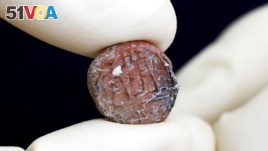12 January, 2018
Archaeologists in Israel have recovered a seal impression that they say confirms the existence of Jerusalem governors identified in ancient religious writings.
The researchers say the impression was discovered in an archaeological project in the Western Wall plaza of Jerusalem.
The small clay object has a message written in the ancient Hebrew language. It says 'Belonging to the governor of the city.'
First evidence of its kind
The archaeologists say the impression could have been placed on shipments from the city leader to another leader or important person.

A conservator shows a 2,700-year-old clay seal impression which archaeologists from the Israel Antiquities Authority say belonged to a biblical governor of Jerusalem and was unearthed in excavations in the Western Wall plaza in Jerusalem's Old City January 1, 2018. REUTERS/Nir Elias.
For historians, the discovery from the First Temple-period of Jerusalem is evidence that the city had a governor at least 2,700 years ago.
A Jerusalem governor is identified two times in The Bible, the holy book of Judaism and Christianity. Until now, there has never been any historical evidence of such a position.
Shlomit Weksler-Bdolah is with Israel's Antiquity Authority. She says this is the first time that researchers have found evidence of the governor in an archeological dig around a structure from 2,700 years ago.
The seal impression shows two men facing each other and wearing striped clothing. They are holding a round object between them, which might be the moon.
Weksler-Bdolah says the meaning of the image is unclear. Archaeologists know that the moon was considered an object of worship in neighboring cultures. Yet this does not explain why the image would show the governor of Jerusalem in what appears to be a position of worship, showing respect to the moon.
The archeologists discovered the clay object some time last year while they were examining dirt from the dig in Jerusalem's Old City.
An important discovery at a difficult time
The seal impression does not have the name of Jerusalem on it. Yet archaeologists say the area where the impression was found proves that it shows a Jerusalem governor. They say it also proves that the city has been an important center of a Jewish state for around 3,000 years.
"The 'governor of the city' is reminded [identified] several times in the Bible in several cities. The 'governor of Jerusalem' is reminded [identified] twice, but we never found him actually in an archaeological excavation, so that's the big importance."
The archaeologists are publicizing their discovery at a time of growing tension around Jerusalem. Recently, United States President Donald Trump recognized the city as Israel's capital. The official standing of Jerusalem is a sensitive issue in the conflict between Israelis and Palestinians. The Palestinians want the eastern part of the city as the capital of their future state.
I'm Phil Dierking.
Zlatica Hoke wrote this story for VOANews. Phil Dierking adapted her story for Learning English. George Grow was the editor.
We want to hear from you. Write to us in the Comments Section or on 51VOA.COM.
_______________________________________________________________
Words in This Story
clay - n. a heavy, sticky material from the earth that is made into different shapes and that becomes hard when it is baked or dried
impression - n. something (such as a design or a footprint) made by pressing or stamping a surface
seal - n. an official mark that is stamped on paper or on a small piece of wax to show that something (such as a document) is genuine and has been officially approved
stripe - n. a long, narrow line of color
worship - v. to show respect and love for God or for a god especially by praying, having religious services, etc.